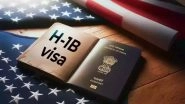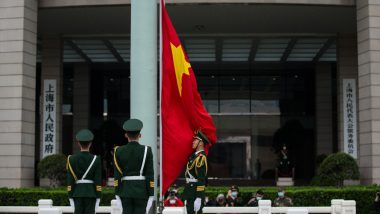Hong Kong, February 7: China is expected to step up retaliation in March against the UK's scheme to offer citizenship to millions of Hong Kong people through British National (Overseas) (BNO) passport, reported Asia Times.
Hong Kong residents will now be required to declare if they hold British citizenship under the BNO passport scheme, according to Asia Times.
Since last July, analysts suggested that Beijing may strip the Chinese citizenship and Hong Kong permanent residency of BNO passport holders. China's National Security Law in Hong Kong: What Has Changed And Why The Legislation Has Led to More Protests?
On January 29, China said that it will de-recognise BNO as a travel and identity document for Hong Kong people from January 31 and reserved the right to take further measures against the UK citizenship scheme.
The UK offered a pathway to eventual citizenship for Hong Kong residents. London unveiled its plan in July last year to take eligible Hong Kongers after Beijing's imposition of the draconian National Security Law.
Tian Feilong, an associate professor at Beijing's Beihang University Law School and director of the Chinese Association of Hong Kong and Macau Studies, said in an interview with TVB on Wednesday that the standing committee would interpret China's Nationality Law for the second time in March if necessary.
"If the number of BNO visa applicants reaches 20,000 to 30,000 this month, I think it touches an alarming level," said Tian. "After BNO status holders are granted British citizenship, their permanent residency, voting rights and social benefits in Hong Kong should be stripped. The Hong Kong government would have to amend its local election and social benefit rules after the reinterpretation of the Nationality Law," he said.
In May 1996, the standing committee gave an explanation about China's Nationality Law's implementation in Hong Kong. From July 1, 1997, Hong Kong people were able to keep using British Dependent Territories Citizens or BNO passports as travel documents, but they would not be entitled to British consular protection in Hong Kong and mainland China.
It is widely believed that by reinterpreting the Nationality Law, Beijing can easily strip the Chinese nationality of those who are granted British citizenship under the BNO citizenship scheme, reported Asia Times.
However, the newspaper said it is more complicated to strip a Hong Kong person's permanent residency as such a move may violate Article 24 of the Basic Law, which states clearly the definition of the city's permanent residents.
Moreover, Tian suggested last year that the National People's Congress (NPC) standing committee should interpret Article 24 of the Basic Law. He said, after the interpretation, BNO status holders given British citizenship would lose their rights to vote and to stand for election. These rights are stated in Article 26 of the Basic Law.
Many Hong Kong netizens have pointed out that the Hong Kong government won't be able to distinguish whether a Hong Kong person is given British citizenship under the BNO scheme or other schemes, which include the British Nationality Selection Scheme launched in 1990 for 50,000 Hong Kong families, reported Asia Times.
However, Lau Siu-kai, vice-president of the Chinese Association of Hong Kong and Macau Studies, said Hong Kong residents would be required to declare to the government if they were given British citizenship under the BNO scheme.
"People given British citizenship under the BNO scheme would enjoy fewer job opportunities in Hong Kong because they would face more challenges when applying for a visa to enter mainland China. These people would then have to return to the United Kingdom as 'second-class citizens' due to their gloomy prospects in Hong Kong," Lau said.
Asia Times said these "punishments" do not seem to be immediate for those who have decided to leave, Beijing's move to stop recognising the BNO as a travel and identity document has hit hundreds of innocent people.
"Minorities from India, Pakistan and Nepal will have to face the brunt, who only hold BNO passports. They cannot apply for Hong Kong SAR passports and Mainland Travel Permits. These people used to apply for China visas with their BNO passports but they could not do so now," said Mohan Chugani, the former president of the India Association Hong Kong.
According to Asia Times, there were about 36,000 Indians, 18,000 Pakistanis and 25,000 Nepals in Hong Kong, according to the last census in 2016. Many of these people hold foreign or Hong Kong SAR passports.
14,645 non-Chinese people applied for Chinese nationality in Hong Kong between 2009 and 2018, according to Immigration Department data. Among the people who applied, only 75 per cent succeeded. The rest were rejected or withdrawn.
(The above story is verified and authored by ANI staff, ANI is South Asia's leading multimedia news agency with over 100 bureaus in India, South Asia and across the globe. ANI brings the latest news on Politics and Current Affairs in India & around the World, Sports, Health, Fitness, Entertainment, & News. The views appearing in the above post do not reflect the opinions of LatestLY)













 Quickly
Quickly


